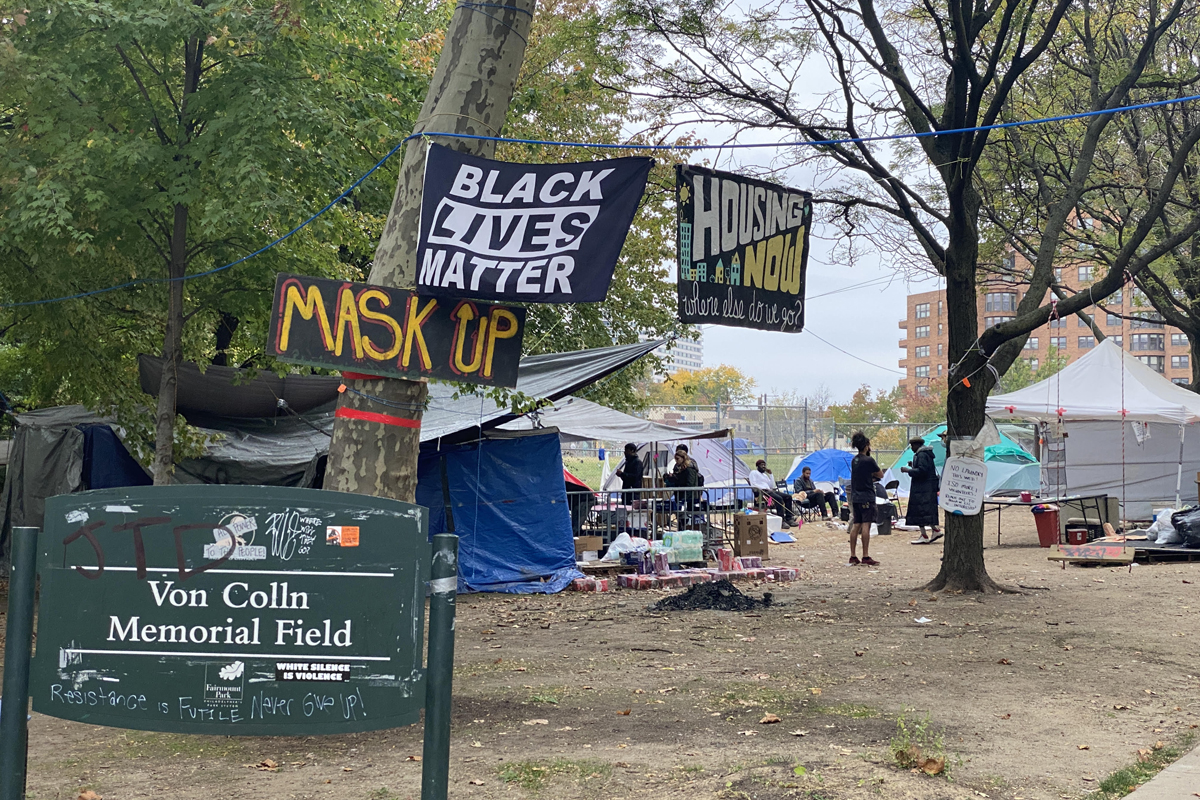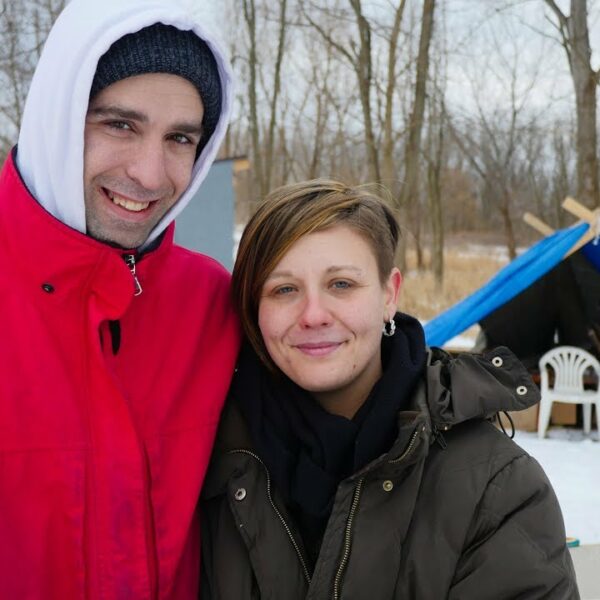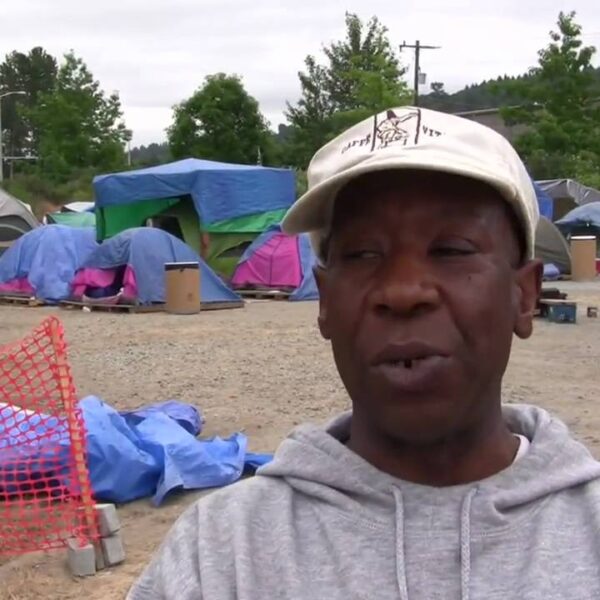If you’re from the greater Philadelphia region like myself, you already know that there’s a crisis on the Benjamin Franklin Parkway. As tents are trashed and encampment residents struggle to get their side of the story heard, the Philly government promises to replace those tents with homes. But there’s a catch. Residents must first agree to relocate to homeless shelters. Since relocation isn’t possible for all, this is a bittersweet deal developing here in the City of Brotherly Love.
Here’s a look at how things are panning out.
What Began as a Protest Has Ended in an “Unprecedented Resolution”
“This is the most disadvantaged and marginalized people in this city calling for this city to provide permanent, affordable, safe, and accessible housing for all its’ residents,” Jamaal Henderson of ACT-UP PHILADELPHIA declared.
His heated words echoed through a bullhorn in an autumn protest, which took place at a notorious Philadelphia encampment located on the Von Colln Athletic Field as well as on the grounds of the Rodin Museum. The protest drew a sizeable crowd comprised of encampment residents and housing advocates. The gripes of our generation sounded out as protestors complained of predatory housing actions like:
- Redlining
- Police brutality
- Racial injustice
- Abuse
- Neglect
- Mismanagement
- State violence
- And generational oppression
At its peak, the encampment boasted at least 150 tents. Officials claim the tents they carried away were unoccupied. Residents disagree. Over the course of several pandemic-laden months, tension has risen, creating a barrier between the people and Philadelphia authorities.
In a shocking twist, the Philadelphia government finally responded by stating they would offer services in exchange for sweeps. These services were to be provided in the form of 50 houses and two tiny house villages. Housing experts called the bold move “an unprecedented resolution”.
A Bittersweet Deal Unfolds for Encampment Residents as Some Are Offered Immediate Shelter, While Others Are Unable to Relocate
“The camp mindset is people thought they’d be getting houses right after de-camping,” claimed one encampment resident who identified himself as Jeremy Williams. “A lot don’t understand that that’s not what’s happening.”
The initial standoff, which was propagated by Occupy PHA, a local agency of advocates that endorses moving Philly homeless families into city-owned housing, produced a total of nine organized meetings between protesters and city reps. The two parties ultimately came to the mutual decision to close down the encampment, under the grounds that tents would be replaced with homes.
Indeed, for residents, a long winter awaits as they hold out hope for this offer, which isn’t slated to come to fruition until early June. Meanwhile, encampment residents with the means to relocate are currently utilizing options made available to them such as:
- Shared Housing
- Private Housing
- A small number of people have relocated to shelters
In the end, the vast majority of encampment residents will be spending the winter indoors, although not all of them will be in the situations they were initially promised right away, and some of them could not find a suitable sheltering option at all.
This Winter, Philly Shelters Are Even More Dangerous and Even Less Accessible for People Experiencing Homelessness
For the nominal number of encampment residents who were unable to secure housing immediately, the situation is much more severe. Snow has already begun dusting the streets of the city. Officials recognized homeless shelters as Coronavirus hotbeds early on. As a result, social distancing has many places operating at minimum capacity or not at all. To make matters worse, the federal relief funding is depleted and the city stands on the brink of a pending mass eviction catastrophe. Even prior to COVID, homeless shelters were difficult or even impossible prospects for many people with:
- Pets (most shelters will not allow them inside)
- Children (many shelters separate children from their homeless parents immediately)
- Odd work hours (homeless shelter hours don’t usually accommodate individuals working the second, third, or graveyard shifts)
- Disabilities (particularly if they require wheelchair-friendly accommodations)
- Compromised immune systems (contagious illnesses tend to travel faster in the confines of homeless shelters)
Even if an encampment resident is fortunate enough to find a shelter bed that doesn’t cost them their dog, job, health, or family, sweeps almost always cost them valuable possessions. From irreplaceable heirlooms to vital medicine and necessary paperwork, much is at risk of being lost when encampments are “cleared”.
Finding Shelter Isn’t the Only Problem. Keeping Shelter Poses Its Fair Share of Obstacles as Well.
Approximately 20 Benjamin Franklin Parkway encampment residents were expeditiously housed in hotel rooms following this sweep. But the coast isn’t clear for those folks either. On December 15th, those 20 individuals were among the 200 homeless residents that got kicked out of the Walnut Street Holiday Inn where they had been temporarily housed.
The following day, six inches of snow covered the Philadelphia Airport. Some places in the greater Philadelphia region garnered over a foot of snow and freezing temperatures continue to fall. Word has it that some of the kicked-out residents will be relocated to halfway houses, a staggering move toward further criminalization if ever there was one.
“You’re going to put people back into this semi-carceral system because they’re indigent, or they caught COVID while in the city’s jails and don’t want to take it back to their families,” Philadelphia Bail Fund Organizer Candace McKinley told NBC News.
Further along in the interview, she mentioned that the setup was not ideal, particularly during a winter where COVID takes its first stab at Philly flu season. As such, the solution, be it unprecedented or not, is neither timely nor efficient. What we have now is hundreds of encampment residents being bounced around all winter long with the hope that summer will mean houses.
Executive director of Philadelphia homeless services Liz Hersh summarized the debacle concisely by making the following statement:
“The reason here that we’re having this conversation is we have thousands of people in this city who are experiencing homelessness … the real issue is that we have people homeless to begin with.”
If you’re in Philadelphia, be sure to remind your representatives that encampment residents along the Parkway and elsewhere need immediate residences, and millions more people need #RentReliefNow.
*Corrections have been made to this article.
At the time of publication, this story was still developing and the original article contained some inaccuracies that have since been revised. Initially, it was mentioned that the encampment was swept when in reality, the city and the encampment residents made a mutual agreement after several meetings.
Initially, it was stated that shelters were the only option encampment residents were offered, when in reality, many of them were taken to shared homes and/or city homes and very few residents wound up spending the winter outdoors.
Also, notably, the original article claimed that the 20 residents who were housed in hotels moved there after the encampment shutdown. Further facts revealed that these residents moved to the hotels voluntarily an prior to the closing of the encampment.
We, at Invisible People would like to thank Philadelphia Housing Action for their many efforts in relaying accurate, factual information and for their advocacy in general.













